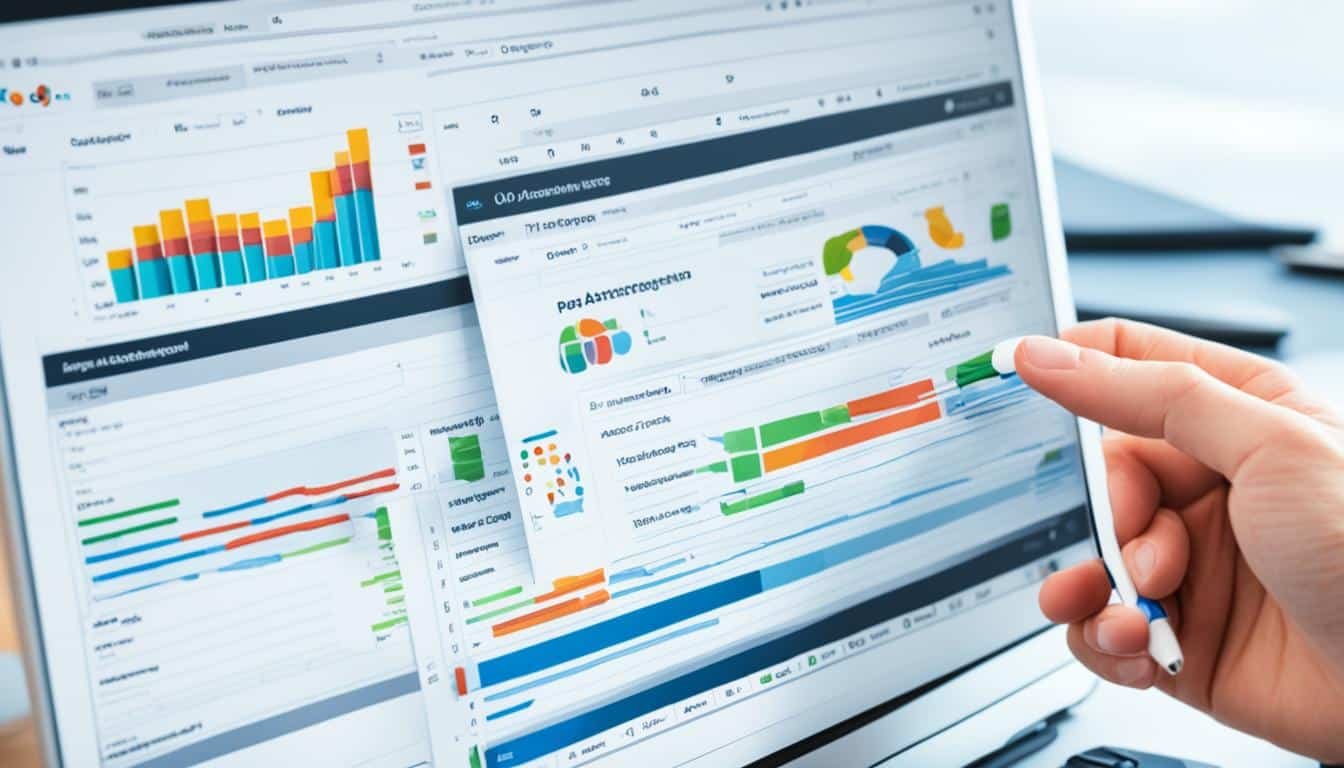Want to boost your online presence and get more leads for your business? Starting a pay-per-click (PPC) advertising campaign could be the answer. This digital marketing tool lets you put your ads at the top of search results and websites. Best part? You only pay when someone clicks on your ad.
PPC advertising is great for leading specific traffic to your site and making them buy. With a smart PPC campaign, you can target your ideal customers. Plus, you get to show off what you sell and see how well your ads are doing.
Key Takeaways
- PPC advertising allows you to only pay when someone clicks on your ad, making it a cost-effective marketing strategy.
- Properly planning your PPC campaign, including defining your goals, researching keywords, and creating compelling ad copy, is crucial for success.
- Continuously monitoring and optimizing your PPC campaigns can help you improve your results and get the most out of your advertising budget.
- PPC advertising can be a powerful tool for driving targeted traffic and generating leads for your business.
- Understanding the key terms and platforms associated with PPC can help you navigate the process and make informed decisions.
What is PPC?
Pay-per-click (PPC) advertising lets businesses and people show ads online, including in search results. You only pay when someone clicks your ad. This makes it a smart way to draw interested visitors to your site.
To use PPC, you pick keywords or phrases related to what you offer. If someone searches for these terms, your ad might show up. If they click your ad, you pay a small fee to the host, like Google or Bing.
How the PPC Model Works
In the PPC world, it’s all about bidding. The more you’re willing to pay, the better your ad’s spot may be. You can tweak your bids for different times, places, or devices to make the most of your ads.
The cost of a click is up to your bid, plus how good your ad and landing page are. Managing your PPC well helps you get more from your ad money. This way, you bring in visitors who are really interested in what you offer.
| PPC Advertising | Traditional Advertising |
|---|---|
| Pay-per-click (PPC) model | Cost-per-impression (CPM) model |
| Targeted and measurable | Less targeted and measurable |
| Flexible and scalable | Less flexible and scalable |
| Real-time data and optimization | Limited data and optimization |
PPC lets you zero in on your desired audience, track how well your ads do, and tweak as needed. It’s a valuable ally for boosting your site’s traffic, raising your brand’s profile, and meeting your marketing aims.
Benefits of PPC Campaigns
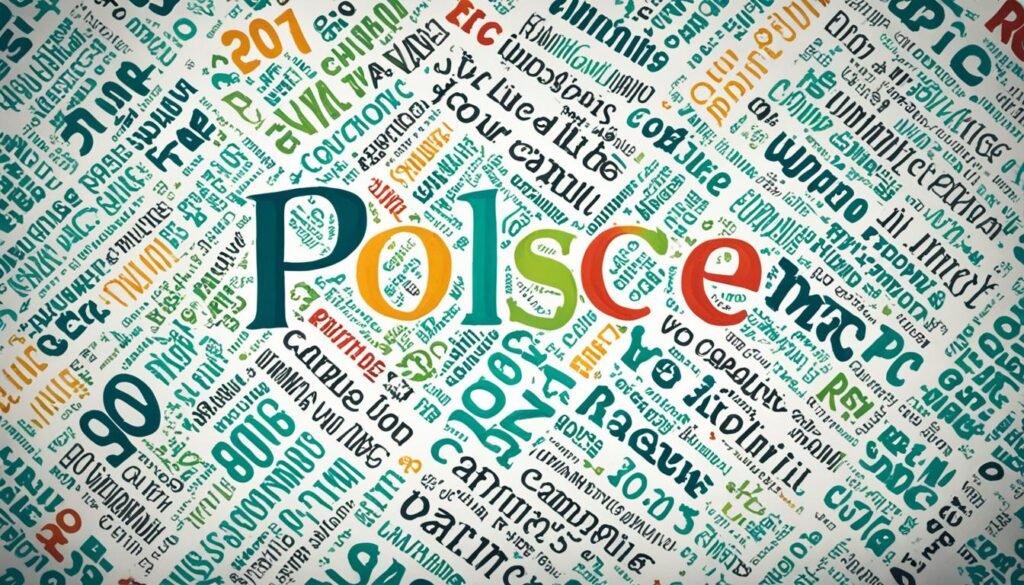
Pay-per-click (PPC) advertising is great for businesses wanting to attract specific visitors to their site. A major benefits of pay-per-click is that it’s cost-effective. You pay only when someone clicks on your ad. This way, your money isn’t wasted on people who don’t end up visiting your site.
PPC also lets you target your ideal customers. By choosing the right keywords and audience, your ads will be shown to those most likely to buy from you. This focused strategy gives you better leads and a higher ROI.
Moreover, PPC can boost increase brand awareness. When your ads are seen at the top of search results, more people will recognize your brand. This leads to more people buying from you in the long run.
But, there’s a downside to PPC – click fraud. This is when fake clicks happen, wasting your ad budget. Search engines try to prevent this, but it’s a risk to keep in mind.
| Benefit | Description |
|---|---|
| Cost-effectiveness | You only pay when someone clicks on your ad, ensuring your advertising budget is used efficiently. |
| Targeted Advertising | You can target your ideal customers by selecting the right keywords and audience parameters. |
| Increased Brand Awareness | PPC ads can help make your business more visible at the top of search engine results pages. |
| Potential for Click Fraud | PPC campaigns can be subject to click fraud, where bots or individuals click on ads to deplete an advertiser’s budget. |
Despite its risks, the advantages of PPC advertising clearly outweigh its drawbacks for businesses. Using PPC wisely can significantly boost your website traffic and PPC campaign ROI. It’s a key element in a successful digital marketing plan.
PPC Campaign Planning
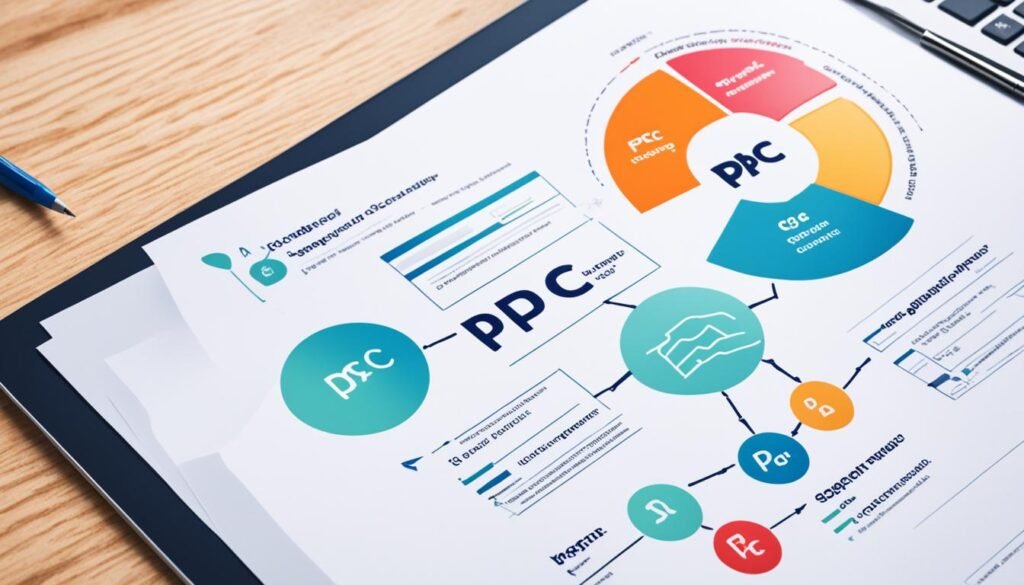
Creating a strong PPC campaign needs a smart strategy. First, you must set clear goals, find the right keywords, look at what your rivals are doing, and pinpoint your audience. By doing all this, your PPC campaign planning process will be solid. It will ensure you get the most out of your ads.
Define Your Goals and Objectives
The kickoff in a PPC campaign strategy is to know what you want to achieve. Do you want more people on your website, more leads, higher sales, or to make your brand known? Knowing your end game is crucial. It directs every part of how you set up your campaign.
Conduct Keyword Research
Researching keywords is vital for a winning PPC campaign. Use tools to find keywords that your audience is searching a lot. Also, look at what keywords your competitors are using. This can show you new opportunities and trends.
Analyze the Competition
It’s key to check out what your competitors are doing in their PPC ads. See what keywords they’re going for and what their ads say. This can help you find ways to shine in the crowd.
Craft Compelling Ad Copy
Writing great ad copy is essential for getting clicks. Make sure your message is short, clear, and shows why your product or service shines. Test different versions to see what works best.
Choose Your Bidding Strategy
When it comes to bidding on ads, you have several options. Think about your goals and budget to pick the best strategy for you. Make sure it fits well with your PPC campaign planning process.
Set Up Audience Targeting
Getting your ads to the right people is key. Use data to build a picture of your ideal customer. Then, target your ads to fit them. As you learn what works, keep refining your targeting.
“The key to a great PPC campaign is planning well and always looking for ways to improve. Spend time setting your goals, getting to know your keywords, checking out the competition, and targeting your ads. This will help you reach your goals.”
PPC Terms and Definitions
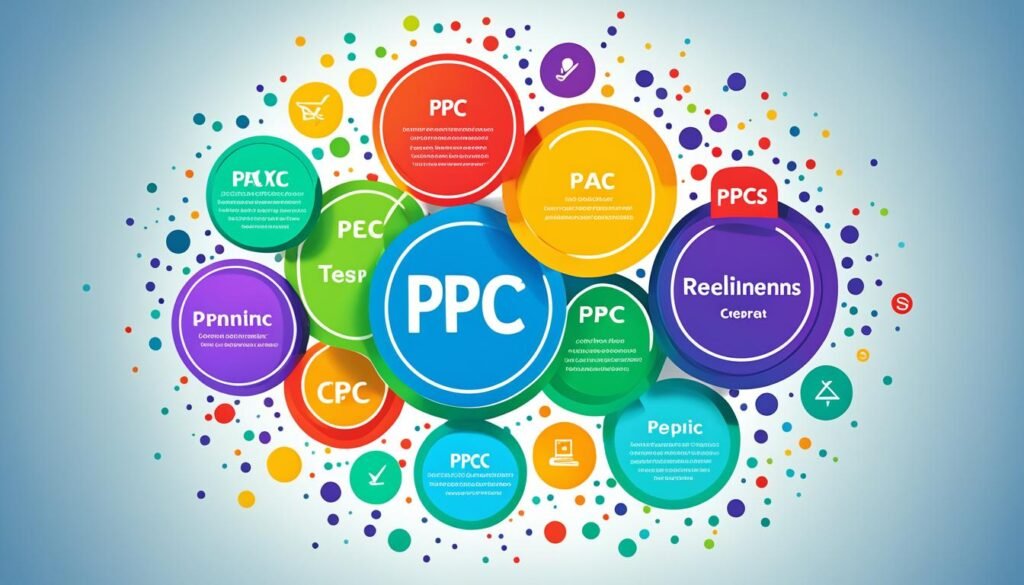
PPC (Pay-Per-Click) advertising is full of vital terms and definitions. To excel in crafting campaigns, you need to know about SEM, CPC, and Quality Score. Understanding these terms helps make your ads effective and successful.
SEM stands for Search Engine Marketing. It’s all about marketing on search engines, paid or unpaid. PPC is a part of SEM where you pay when someone clicks your ad. CPC is your bid, the amount you pay for each click on your ad.
Important terms in PPC include:
- Ad Rank – Where an ad shows on a search results page, based on bid and quality score.
- Quality Score – Rates how good and relevant an ad and page are, influencing placement and cost.
- Maximum Bid – The most an advertiser will pay for someone to click their ad.
- Campaign – The entire plan for your PPC, including who you target, your budget, and the ads you use.
- Ad Group – A set of ads and keywords that all aim at a similar audience or topic.
- Keywords – The terms that, when searched, make your ad appear.
- Ad Text – The wording and images that form the ad itself.
- Landing Page – The first page a visitor reaches after clicking your ad.
Learning these terms is key to making your ads work well for your business.
| PPC Term | Definition |
|---|---|
| Search Engine Marketing (SEM) | Any digital marketing, paid or unpaid, done on a search engine. |
| Cost-Per-Click (CPC) | The amount an advertiser pays for each click on their ad, which acts as their bid in an auction determining ad placement. |
| Ad Rank | The position of an ad on the search engine results page, determined by factors like bid amount and quality score. |
| Quality Score | A metric that reflects the relevance and quality of an advertiser’s ad and landing page, affecting both ad placement and CPC. |
| Maximum Bid | The highest amount an advertiser is willing to pay for a click on their ad. |
| Campaign | The overall PPC strategy and settings, such as targeting, budget, and ad groups. |
| Ad Group | A collection of ads and associated keywords that share a common theme or target audience. |
| Keywords | The search terms that trigger the display of an advertiser’s ad. |
| Ad Text | The copy and visuals that make up the actual advertisement. |
| Landing Page | The web page that a user is directed to after clicking on a PPC ad. |
Gaining mastery over PPC terminology and PPC advertising definitions leads to powerful PPC campaigns. These campaigns will bring solid results for your business.
PPC Platforms
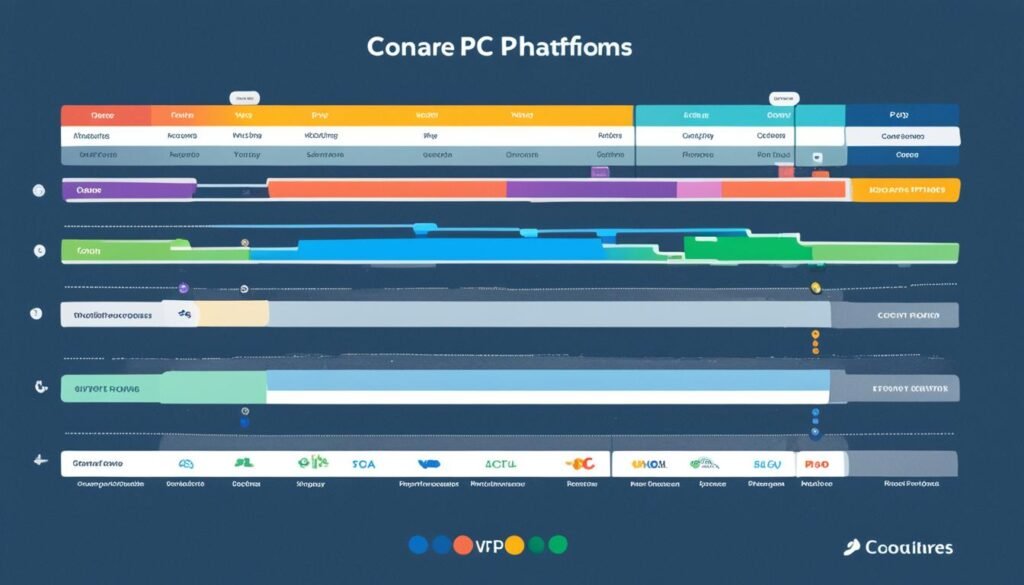
When you want to run PPC advertising campaigns, you have several top PPC platforms to choose from. Google Ads (AdWords) is the most popular. It lets you show ads on Google’s search results and on websites. Bing Ads is also common and offers ads on Bing’s search page.
PPC platforms on social media are also great. Facebook Ads, for example, lets you create ads that look like regular posts. This makes your ads part of the social media feed.
Choosing the best PPC platform for your business is key. Think about who you want to reach, your budget, and your goals. Look at each platform’s good and bad points to pick the best one for your needs.
| PPC Platform | Targeting Capabilities | Audience Size | Average CPC |
|---|---|---|---|
| Google Ads | Keyword, location, device, audience | Largest search engine user base | $1 – $2 |
| Bing Ads | Keyword, location, device, audience | Second-largest search engine user base | $0.50 – $1.50 |
| Facebook Ads | Demographic, interest, behavior, location | Over 2 billion active users | $0.50 – $3.00 |
“Selecting the right PPC platform is crucial for the success of your advertising campaigns. Each platform offers unique targeting capabilities and audience reach, so it’s important to carefully evaluate your options to find the best fit for your business.”
Learning about the top PPC platforms and PPC advertising channels helps you choose wisely. This knowledge lets you create PPC campaigns that bring in the right visitors and leads to your business.
PPC Campaign
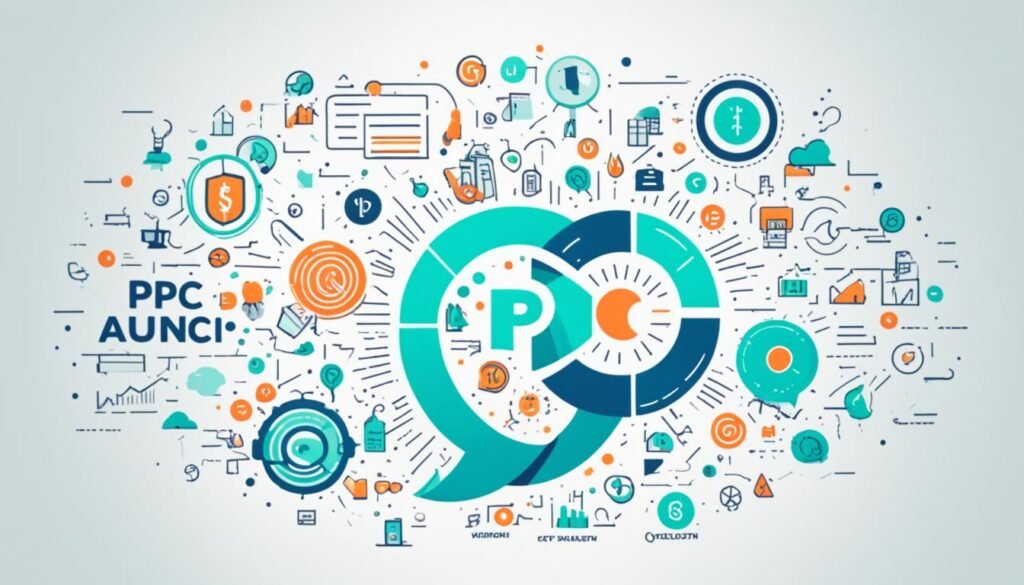
Running a successful PPC (Pay-Per-Click) campaign needs careful planning. You must focus on the campaign’s structure, its individual ads, and effective PPC strategies. These are the building blocks for a strong PPC campaign.
The PPC campaign structure starts with the main campaign. It sets the theme, message, and goals. Under this, you have ad groups. They group related keywords and ads together.
- Start by setting your campaign goals, such as increasing website visits, getting leads, or selling more online.
- Next, do your keyword research to find the best terms to aim for.
- Then, make ad copy that speaks to your audience and boosts clicks.
- Also, make landing pages that match your ad’s message and offer a smooth experience.
- Setting the right bidding strategy to get the most out of your PPC budget is crucial.
- And, targeting your audience well is key. Factors like location, interests, and behaviors matter.
To make your PPC campaign work, ensure your structure is solid. Also, work on your ads and incorporate the best PPC strategies. This way, your ad reaches the right people and turns into real business results.
| PPC Campaign Component | Description |
|---|---|
| Campaign | The main advertising push, outlining goals and messages |
| Ad Groups | Groups of keywords and ads, tailored to specific targets |
| Keywords | Search terms used to show your ads on search result pages |
| Ad Copy | Words and images in your ads, aimed at getting attention and clicks |
| Landing Pages | Web pages for users after clicking ads, offering a smooth visit |
| Bidding Strategy | Your method of deciding how much to pay for clicks, to get the best value |
| Audience Targeting | Choosing specific customer types to show your ads to, using details like location and interests |
“Success in a PPC campaign comes from blending its parts harmoniously. This ensures your ad is strong and effective for the people you want to reach.”
Keyword Research and Selection

Conducting thorough PPC keyword research is key in creating a great pay-per-click (PPC) advertising plan. Finding the best keywords will show your ads to the right people. This can increase clicks, conversions, and your return on investment.
The Keyword Magic Tool is a top pick for keyword selection for PPC. It uncovers many relevant keywords and lets you check their search volume. This tool finds both general high-volume keywords and more specific, long-tail keywords for PPC that show people are ready to buy.
Analyzing Keyword Relevance and Search Volume
Your keyword research should connect closely with what your business offers. You want keywords that get searched a lot and truly match what you sell. This balance will make sure the right customers see your ads.
- Analyze the search volume of potential keywords to understand how often they are being searched for by your target audience.
- Evaluate the relevance of each keyword by considering how closely it matches the products or services you offer and the search intent of your potential customers.
- Identify a mix of broad, high-volume keywords as well as more specific, long-tail keywords that indicate stronger purchase intent.
Choosing the right keywords for your PPC ads is crucial for success. This strategy can greatly improve your advertising and bring better results for your business.
“Effective keyword research is the foundation of a successful PPC campaign. It allows you to connect with your target audience and ensure your ads are shown to the right people at the right time.”
Ad Copy and Landing Pages
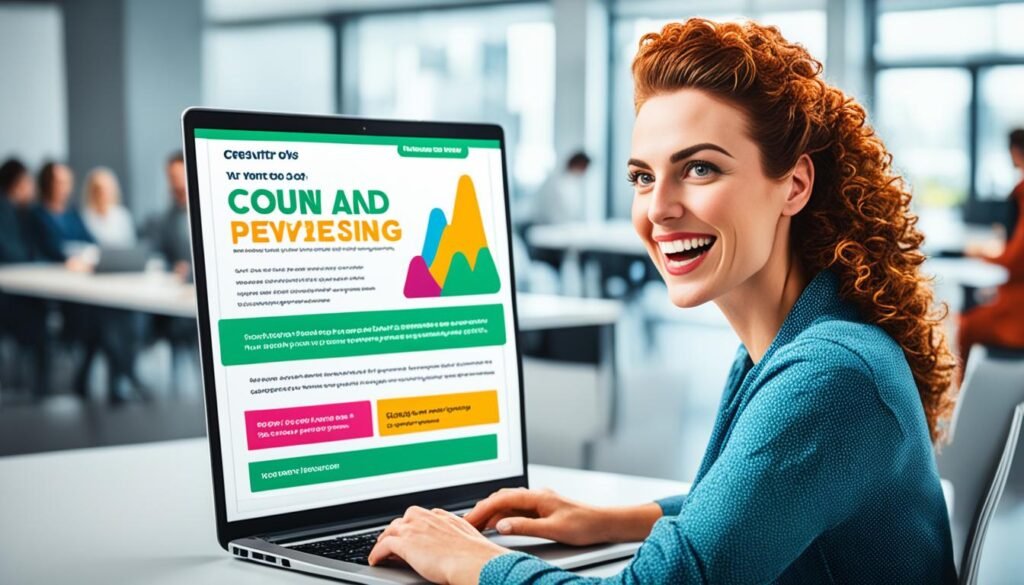
Creating strong PPC ad copywriting and smart PPC landing page design is crucial for your PPC ad campaigns to do well. Your ad text must be short, talk about your key words, and show what makes you special.
To make a good PPC ad, use a powerful call-to-action (CTA). A CTA tells people what you want them to do next, like “Shop Now,” “Learn More,” or “Sign Up Today.”
Your PPC landing page needs to match your ad closely. It should be easy to understand and have a clear next step for the visitor. Make sure it looks good on phones since many people click ads from their mobiles.
Always work on making your PPC landing page better. Try different designs, messages, and CTAs to see what works best. Look at the data to see what keeps people interested and convinces them to buy or sign up.
“The key to successful PPC ad copywriting and PPC landing page optimization is to provide a seamless, engaging user experience that compels your audience to take the desired action.”
The PPC campaigns you run will do better with great ad text and landing pages. Keep making content that people love and always make your website better. This way, you’ll see more success from what you spend on your ads and your business will grow steadily.
PPC Campaign Monitoring and Optimization

Looking after your PPC campaigns well is key to getting good results from your ad money. It involves keeping a close eye on how your ads are doing, changing your game plan, and trying new strategies. This way, your PPC campaign can keep getting better.
Analyze Performance Data
First, focus on important numbers like how many people click your ads, how many turn into customers, and how much you pay for each click. Keep checking these stats to spot where you can do better. What works best in your ads, who your ads target, and how much you bid are key areas to look at.
Optimize Bids and Targeting
With the data you gather, you can improve your PPC campaign optimization. Change your bids to make sure your ads show up well for certain searches. Plus, try aiming your ads at different groups to find the best audience. Using tools that help manage bids can make this easier.
Test and Iterate
Regularly testing your ads and pages is crucial for success. Experiment with various ad types, design your pages differently, and change your messages to see what people like best. Then, study these tests to better your advertising plan.
By always keeping an eye on your PPC ads, tweaking your bids and who you aim them at, and trying out new ideas, you can make the most out of your ad spending. This continuous process of testing and fixing things plays a major role in your PPC campaign management.
Also Read : What Are The Different Types Of Advertising?
Conclusion
This guide has covered the vital aspects of a good PPC strategy. You learned everything from the basics of PPC to how to analyze keywords and create better ads. Now, you have the tools to use PPC effectively for your business.
The main points of a successful PPC strategy recap are setting clear goals, finding the best keywords, making catchy ads, and creating attractive landing pages. It’s also crucial to keep an eye on your campaigns and make constant improvements. Following these PPC campaign best practices will attract the right people and increase your sales.
PPC is an always evolving advertising method. It is important to keep learning about it, connect with experts, and be open to trying new things. By focusing on the key takeaways for PPC and working hard, you can make PPC work well for your business. With time and effort, you will see your business grow thanks to PPC.
FAQs
What is PPC?
Pay-per-click (PPC) lets you pay a search engine to show your site when people search certain terms. You only pay if someone clicks on your ad. This way, you can drive more visitors to your site.
What are the benefits of PPC campaigns?
PPC is great because you pay only for the clicks you get. It targets your ideal customers, brings better leads, and boosts your brand by appearing on top of search results.
What are the key steps in planning a PPC campaign?
Start by setting your goals. Then, choose the best keywords and check out your competitors. Make ads that stand out and pick a bidding plan. Don’t forget about targeting your audience well.
What are some key terms and definitions related to PPC advertising?
Important terms in PPC are SEM, CPC, Ad Rank, Quality Score, and your Maximum Bid. You also need to know about Campaigns, Ad Groups, Keywords, Ad Text, and Landing Pages.
What are some popular platforms for running PPC advertising campaigns?
Google Ads, Bing Ads, and Facebook Ads are top choices for PPC. When you choose, think about how well they target, their audience, cost, and your budget.
What are the key components of a PPC campaign?
A PPC campaign has ads, keyword groups, bidding plans, and how you target your audience. Each part works together to get the best results.
How do I select the right keywords for my PPC campaign?
Choosing the right keywords is key. Use tools to find words that fit your business and have high search volume. Mix common keywords with very specific ones for best results.
What goes into creating effective PPC ad copy and landing pages?
Make your ad copy catchy and directly related to your keywords. It should tell why you’re the best choice. Your landing page must be linked, clear, and focused on getting visitors to take action.
How do I monitor and optimize my PPC campaigns?
Keep an eye on your campaigns and tweak them as needed. Use data to make smart choices. This could mean changing bids, improving your targeting, or testing new ads.
Source Links
- https://www.semrush.com/blog/ppc-strategy/
- https://www.mailmodo.com/guides/pay-per-click/
- https://blog.hubspot.com/marketing/ppc
